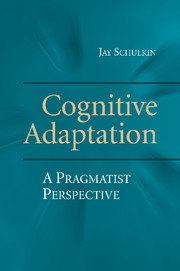Book contents
- Frontmatter
- Contents
- Preface
- Introduction
- 1 Cognitive Adaptation, Objects, and Inquiry
- 2 The Human Situation: Uncertainty and Adaptation
- 3 Time and Memory: Historical Sensibilities
- 4 Educational Sensibilities
- 5 An Instinct for Spiritual Quests: Quiet Religion
- Conclusion: Demythologized Reason
- References
- Index
5 - An Instinct for Spiritual Quests: Quiet Religion
Published online by Cambridge University Press: 08 August 2009
- Frontmatter
- Contents
- Preface
- Introduction
- 1 Cognitive Adaptation, Objects, and Inquiry
- 2 The Human Situation: Uncertainty and Adaptation
- 3 Time and Memory: Historical Sensibilities
- 4 Educational Sensibilities
- 5 An Instinct for Spiritual Quests: Quiet Religion
- Conclusion: Demythologized Reason
- References
- Index
Summary
Any one of our beliefs is subject to criticism, revision and even ultimate elimination through the development of its own implications by intelligently directed action.
– John Dewey, The Influence of Darwin on PhilosophyIntroduction. Spiritual quests are not an aberration or a pathological state. They are, rather, a fundamental need. Moreover, conversions to “seeing” events in a certain way are at the basis of scientific and other forms of experience, as are spiritual quests (Heelan, 1994).
Importantly, as John Dewey (1934/1970) noted in his book A Common Faith, “any activity pursued in behalf of an ideal end against obstacles and in spite of threats of personal loss because of conviction of its general and enduring value is religious in quality” (p. 27). What is important is to provide sustenance for what is valuable and alive (see also Kitcher, 2007). Particularly in an age of theological fundamentalism, self-corrective inquiry, a commitment to nonviolence, and humility serve as useful adjuncts to any investigation of religious belief.
Religious quests are vital human activities and cut across both the sciences and the humanities. Religious sensibility is one thing; religious tyranny is quite another. Religious sensibility, at its normative best, is humble and pluralistic. The approach that I suggest avoids dismissive positivism and dogmatic theological fundamentalism to favor a pious naturalism.
My argument is that religious sensibility – a basic human predilection – needs to be knotted to self-corrective inquiry and humility to avoid religious tyranny, which is no easy chore.
- Type
- Chapter
- Information
- Cognitive AdaptationA Pragmatist Perspective, pp. 123 - 143Publisher: Cambridge University PressPrint publication year: 2008



